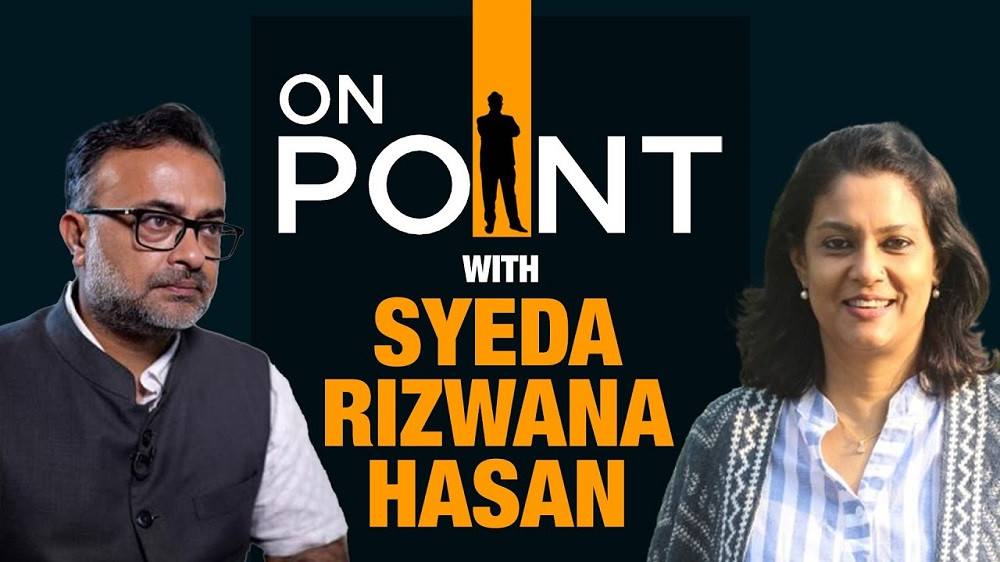‘India-Bangladesh ties need to be revised, made people-oriented’
Environment adviser Syed Rizwana Hasan gives interview to India’s News9
Daily Sun Report, Dhaka
Published: 14 Aug 2024

Kartikeya Sharma (L) of News9 took the interview of Syed Rizwana Hasan on Monday. Photo: Collected
The Indian government needs to work with Bangladeshi policymakers for reviewing bilateral relationships to address past mistakes and ensure that mutual accords reflect the aspirations of people from both countries, the environment adviser told an Indian media outlet in an exclusive interview.
Kartikeya Sharma of News9 took the interview of Syed Rizwana Hasan, and it was live streamed on Monday.
In reply to Kartikeya’s query about how the interim government plans to restore ties with India, in the wake of Sheikh Hasina’s ouster as premier, Syed Rizwana said it is not only the duty of the new Professor Dr Muhammad Yunus-led administration to revive relationships but also of Indian central government.
In view of the “mistakes” made in the past in ensuring mutually beneficial ties, the relationship need to be revised rather than simply restored in order to make it thoroughly cooperative, friendly and people-oriented, Rizwana added.
In another question she said the transitional government’s main challenge is reforming state institutions that were heavily politicised over the last 15 years by the ousted Awami League (AL) for maintaining its grip on power illegally won through repeated rigged elections.
The state bodies would be transformed into the organisations for people rather than for political parties, as has been the norm for decades in Bangladesh, she said outlining the interim government’s primary reform agenda.
She, however, made no mention of holding general elections, and rather implied that bottom-up overhaul of state institutions is needed first.
Rizwana added that public universities and colleges were also operated by AL-allied people, allowing the party’s student wing to run criminal and terrorist activities against general students.
This crisis prevented students, who dominated the movement to oust AL, from returning to their educational institutions, and this necessitated the resignation of almost all the top executive officials at the institutions.
With their resignation, which had already started, students could gradually return to their studies, Rizwana said to Kartikeya as he asked why students were not returning to classes even after their movement to topple government succeeded.
Economic revitalisation is a key priority for the interim government and the finance adviser had already made new appointments in almost all the top central bank posts in the space of 24 hours.
Improving foreign currency reserves and price control measures were also being focused on for supporting Bangladesh’s ailing economy, Rizwana said.
She hoped improvements would happen eventually, noting that some other countries, including neighbouring Sri Lanka, managed to cross similar economic hurdles.
About minority attacks following Sheikh Hasina’s ouster, Rizwana said these were political rather than communal in nature and have occurred repeatedly at times of political shakeups throughout the history of Bangladesh.
In some cases, vested parties sought to gain from such violence.
In the case of the 5 August revolution, not only people from the minority Hindu or Ahmadiya communities, but also Sunni Muslims were attacked for having ties to the ousted Awami League.
Kartikeya said many in the international community were concerned at signs of Islamic radicals gaining a share of power due to Hasina’s fall.
Rizwana allayed the concerns saying Islamic parties altogether have never gained more than 5% of votes in general elections in Bangladesh. With the fall of Hasina, they would naturally feel emboldened but there is no need to think their voter base would expand overnight.
The concerns of Islamic people getting an advantage have been raised time and again, but needlessly, she said.
She, however, highlighted that not only domestic but external factors can also influence religious voter banks of a country. For example, in India, the demolition of Babri Mosque and the grossly inadequate protection of Muslim lives and proportion, could surely bolster Islamic causes in Bangladesh.
And yet, fortunately, such was not the case, she added.

